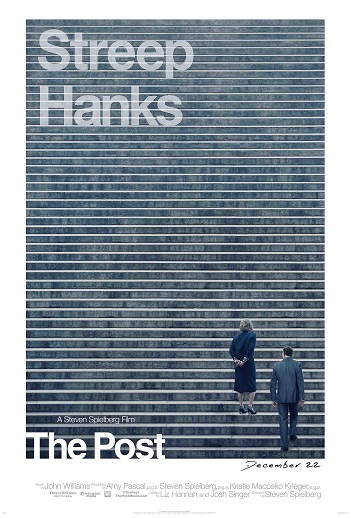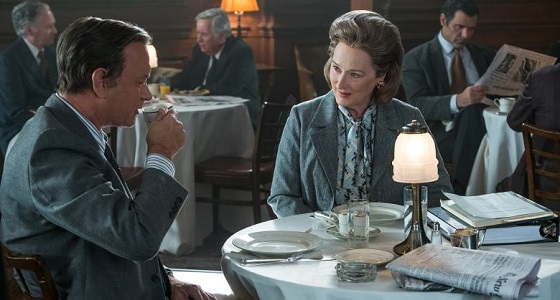Now that we have a president who’s effectively declared all-out war on the press, Steven Spielberg’s true-story historical drama The Post is more timely than ever. (That’s why the director rushed it into production this past May and finished it in near-record time for a big Hollywood movie.)
Unlike recent Best Picture winner Spotlight, The Post is not about thorough investigative journalism. No, the Pentagon Papers—a decades-long classified government report detailing the mistruths told to the American people about the Vietnam War—are dropped right in the lap of the New York Times and then Washington Post. Instead, The Post is about the right of the press to publish the truth when its government is lying.
Tom Hanks is famed Post editor Ben Bradlee (who was played by Jason Robards in All the President’s Men), and he’s as reliable a conscience as ever, but it’s Meryl Streep as publisher Katharine Graham who does most of the heavy lifting. Underestimated by every one of her all-male board of directors, she makes the gutsy decision to publish the classified papers, even after President Nixon’s administration secured a court order against publication.
The Post is about an absolutely crucial period in recent American history, one that seems in danger of repeating itself. And there’s some truly great moments in the movie. Streep’s performance has range, mixing both vulnerability and confidence. Camera movement and zooms relay a sense of urgency, even in the drab environs of a newspaper office. But here’s the rub—by the end of the movie, Spielberg blows all of his slow and careful buildup by repeatedly hitting his audience over the head.
Characters begin speechifying, each one relaying the movie’s thesis as they see it, and then patting themselves on the back. A nicely underplayed moment of Graham refusing attention is quickly ruined by a swelling John Williams score and by Streep descending a staircase as women of every age and color look up to her with admiring eyes. Finally, actual audio of furious Nixon phone calls is played while a Nixon lookalike bangs his fists comically on a table, just inside the curtains of the Oval Office.
On her way out of the theater, a friend of mine called The Post “Baby’s First First Amendment Movie,” and she’s right. There’s no doubt that the free press plays an essential role in a democracy, and the timeliness of this picture can’t be disputed. (In fact, it has become more timely since its filming as it enters a culture where men in powerful positions are finally being held accountable for holding that power over women.)
It’s just too bad Spielberg doesn’t trust his audience enough to let them come to those conclusions on their own.
This review is part of Eric Melin’s “LM Screen” column that appears in the spring 2018 edition of Lawrence Magazine.











Comments on this entry are closed.